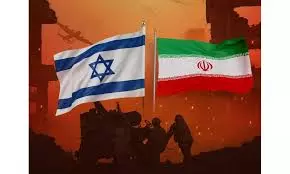
New Delhi: India can play the role of a mediator in the Israel-Iran conflict and contribute to regional peace, but it must first condemn Israeli aggression against Iran, Iranian deputy chief of mission (DCM) in New Delhi, Javad Hosseini, said on Friday. He also revealed that Iran had reopened its previously closed airspace to facilitate the evacuation of around 1,000 Indian nationals from Mashhad.
Hosseini stated that Iranian private carrier Mahan Air would operate one flight from Mashhad to Delhi on Friday, with two additional flights scheduled for Saturday, and possibly more on Sunday. According to Indian government sources, these are evacuation flights organised under Operation Sindhu. Another evacuation flight from Ashgabat, Turkmenistan, a neighbouring country to Iran, was also scheduled to arrive in Delhi on Friday night. Indian nationals on that flight had earlier crossed into Turkmenistan through the Iranian land border with assistance from the Indian Embassy in Iran.
The Iranian DCM said that approximately 1,000 Indian nationals had been evacuated from Tehran to Qom and then to Mashhad, from where they would all be flown to Delhi by the weekend. “The Iranian airspace was closed, but we have opened it so that Indian nationals can be brought back safely,” he said.
Addressing reporters, Hosseini said Iran expected India, as a voice of the Global South, to condemn the Israeli airstrikes. He acknowledged India’s balanced relationship with both Iran and Israel and its desire to maintain neutrality. However, he asserted, “This is a matter of aggression by Israel against a sovereign nation. It should be condemned. That is our expectation from India.”
When asked whether India could play a mediator’s role, Hosseini said, “India has already expressed willingness to contribute to peace in the region, but first they should condemn the Israeli actions. We will not sit with Israel for any negotiations. We will engage with countries that act as mediators.”
He added that countries like Russia and China were already prepared to mediate and that Iran would also be holding talks with some European nations on the issue.
Responding to India’s decision to distance itself from a Shanghai Cooperation Organisation (SCO) statement condemning Israeli actions, a resolution that required consensus, Hosseini noted, “India did not break the consensus, which we see as a positive development. However, we still expected India to openly condemn Israel’s actions.”
Sounding a stern warning about the ongoing conflict, Hosseini declared, “We will never surrender. We will die, but surrender will never happen. We are on the right side of history. Iran will write the end of this story. We are ready for peace, but not for an imposed peace.”
He also clarified that Iran does not possess any nuclear weapons.
Commenting on reports that Iran had attacked a medical centre in Israel, the diplomat said Iran had targeted a military headquarters located near the centre. “The explosion may have caused some damage to the medical facility, but our intention was never to strike it,” he said. He contrasted this with Israel’s actions, alleging that “Israel has deliberately attacked hospitals in Gaza.”
Criticising Israeli policies, Hosseini said, “Israel always plays the victim, although it is the aggressor. It has nuclear weapons and has attacked five neighboring countries, something Iran has never done.”





